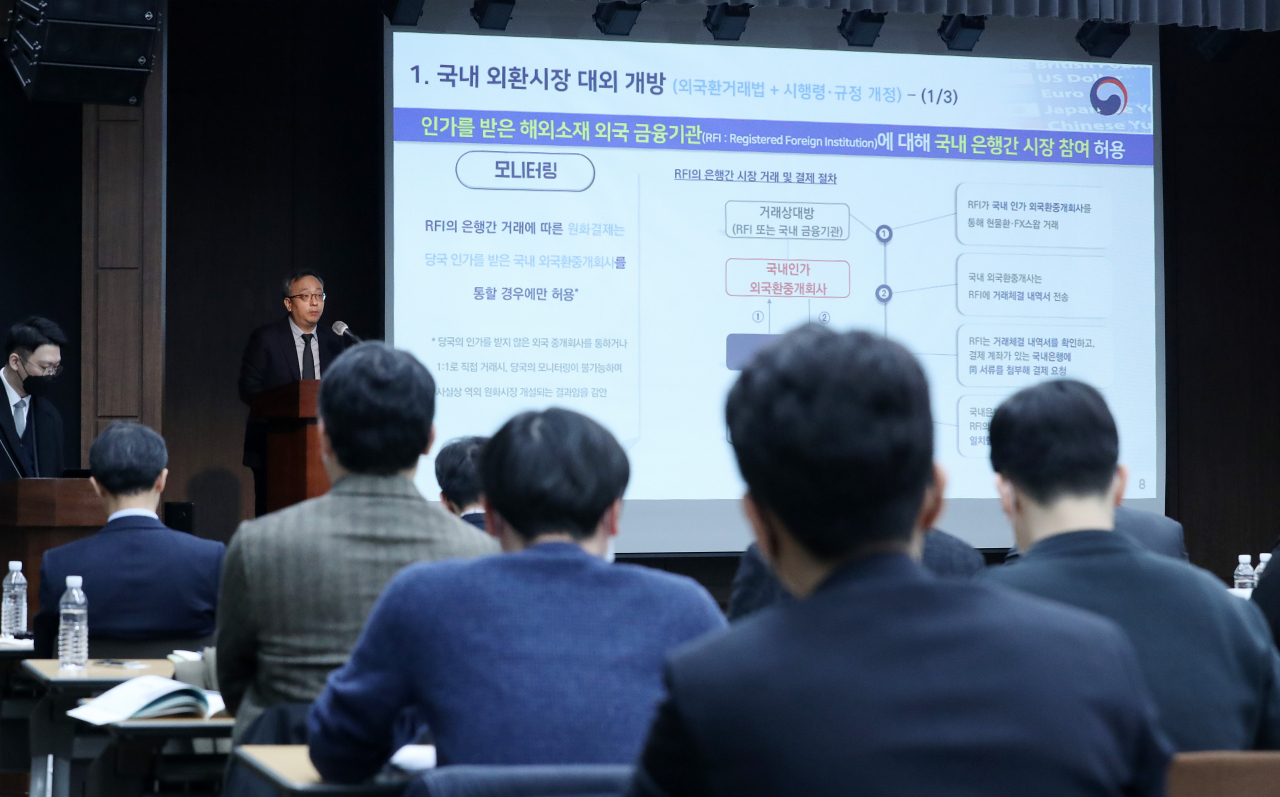Korea to open up FX market to offshore firms
Financial authorities to push for allowing offshore transactions, extending forex market hours until 2 a.m.
By Im Eun-byelPublished : Feb. 7, 2023 - 15:34

Financial authorities to push for allowing participation of offshore firms in forex market, while extending operating hours until 2 a.m.
In hopes of conforming the Korean market to global standards, Korea is to push for changes in the foreign exchange market, including allowing the participation of offshore firms and extending market hours until 2 a.m.
The Ministry of Economy and Finance and the Bank of Korea held a seminar on Tuesday in Seoul, announcing measures to be taken to elevate the status of Korea’s foreign exchange market in the global finance market.
“The Korean foreign exchange market has been under a closed, restrictive structure for decades, prioritizing market stability as it was traumatized by the foreign exchange crisis in the past,” Finance Ministry’s Deputy Director General for International Finance Bureau Kim Seong-wook said at the seminar, referring to the financial crisis from 1997.
“Now is the time to change it,” Kim said.
The proposed changes to Korea’s foreign exchange market include allowing registered foreign institutions, or RFIs, to participate in spot exchanges and forex swap exchanges. Currently, only 54 certified local financial institutions, including banks and securities firms, can take part in the interbank forex market.
Under the new policy shift, global banks and securities firms, approved by the Korean government, will be allowed to participate in the market, meaning that global investment banks such as JP Morgan and Goldman Sachs with branches in Korea can trade the Korean won with domestic banks through certified foreign exchange brokers. However, global principal trading firms and hedge funds will be excluded from the market.
The authorities said only firms with credit lines sufficient for holding transactions with other players in the market will be allowed to take part.
In future, RFIs could be allowed to participate in the market for derivatives in foreign currency and currency options.
"We will closely monitor the capital transactions of the RFIs, working on ways to regulate their actions in cases of emergency, cooperating with local regulators," Kim said.
Including the measure involving foreign offshore firms' participation, the revamp schemes are to go into effect from as early as July 2024 after a six-month trial run. The authorities are to submit a reform of the Foreign Exchange Transactions Act bill to the National Assembly during the second half of this year.
“Though many are worried the opening could lead to potentially increased volatility in the foreign exchange market, the currency volatility could decrease with more transaction volume and market players with diverse characteristics,” said Song Dae-keun, director of the Bank of Korea’s Foreign Exchange Business Division at a press briefing held Monday.
Another change includes lengthening the foreign exchange trading hours from the current 9 a.m. to 3:30 p.m. to 9 a.m. to 2 a.m. The change is to allow the market to run during the hours when the London finance market is open. The authorities are looking into opening the market for 24 hours in the future.
The 2 a.m. closing time will eliminate the gap between the expected currency exchange rate and the actual price for foreign investors who are looking to invest in Korea as they make investment decisions during operating hours. The same goes for Korean investors who want to make investments in overseas markets.
Furthermore, authorities are hoping to approve more digital transactions for the foreign trading market, such as allowing RFIs to use application programming interfaces, or APIs, for forex deals, which enables customers and brokerages to monitor real-time transactions.
The closed, restrictive structure of the foreign exchange market hinders the currency stability, standing in the way of the development of the capital market and financial industry, the Finance Ministry explained.
The foreign exchange market grew slowly, even when the Korean economy nearly doubled in terms of trade volume and equity market size from 2008 to 2022.
The daily volume of Korea's won-dollar spot exchange, for instance, grew from $1.83 billion (2.3 trillion won) in 1997 to $7.81 billion in 2008, but has not been able to excel further, remaining at $9.04 billion won in 2022.
In addition, the volume of transactions in the non-deliverable forward market has surpassed that of the spot exchange market in the 2010s, indicating that there is a gap between the market expectation and actual demand in the Korean foreign exchange market.
The new plan is interpreted to be part of a move to upgrade the status of Korea’s financial market system to developed market status from Morgan Stanley Capital International. The MSCI has called for a full opening of the Korean foreign exchange market for it to be included on the list.
Over the past several years, the government has been working on improving the local finance market by easing regulations in a move to make Korea an environment that can attract more foreign investors.








![[Hello India] Hyundai Motor vows to boost 'clean mobility' in India](http://res.heraldm.com/phpwas/restmb_idxmake.php?idx=644&simg=/content/image/2024/04/25/20240425050672_0.jpg&u=)










